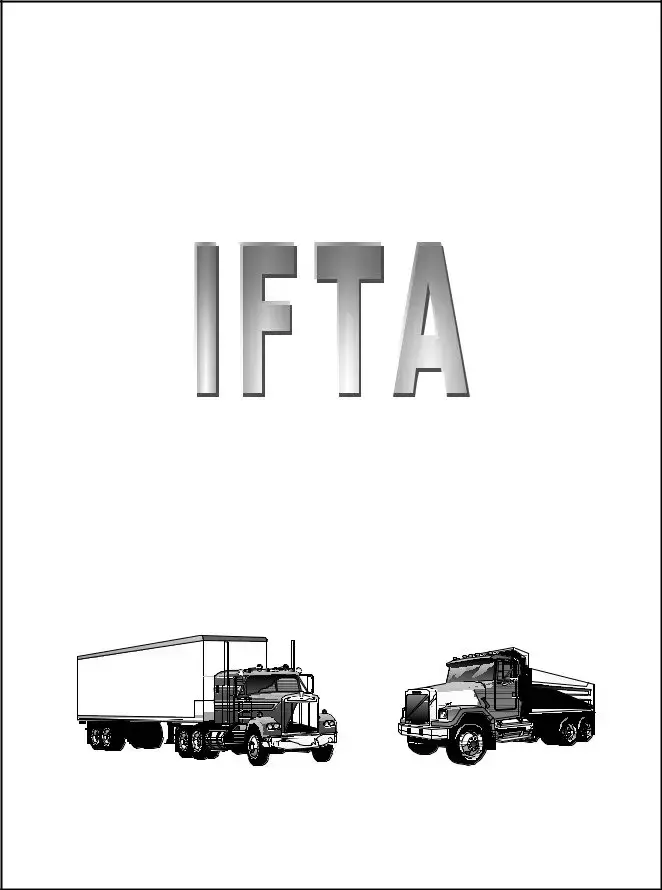Fill Out a Valid Nj Ifta Template
The New Jersey International Fuel Tax Agreement (IFTA) Licensee Manual, issued in January 2006, serves as a comprehensive guide for motor carriers aiming to license under the IFTA. This agreement, shared among states and Canadian Provinces, is designed to streamline the reporting of fuel taxes for carriers that operate across jurisdictional lines. For carriers operating qualified motor vehicles that traverse New Jersey highways and at least one other member jurisdiction, New Jersey can act as the base jurisdiction. The manual highlights the substantial benefits of obtaining an IFTA license, such as the simplification of tax reporting through a single application process, issuance of one set of credentials, and the need to file only one quarterly tax report. Furthermore, in most cases, audit responsibilities will be consolidated under the carrier's base jurisdiction, facilitating a more streamlined process. Obtaining technical support and further information is facilitated through direct contact with the Motor Vehicle Commission's Motor Carrier Services. Understanding the terms "base jurisdiction" and "qualified motor vehicle" is foundational, as these define the carrier's primary location for IFTA licensing and the vehicles eligible under the agreement. The manual outlines application requirements, fee schedules, decal and license issuance, and reporting obligations, all designed to aid carriers in maintaining compliance while benefiting from the efficiencies provided by the IFTA. With specifics on registration, credentialing, penalties, and even procedures for appealing against audits, the manual is an essential resource for interstate motor carriers looking to navigate the complexities of fuel tax reporting under the IFTA framework.
Sample - Nj Ifta Form

STATE OF |
NEW JERSEY |
INTERNATIONAL |
FUEL TAX |
AGREEMENT |
LICENSEE MANUAL |
JANUARY 2006 |

IFTA Licensee Manual
INTRODUCTION
The purpose of this manual is to outline the steps involved in licensing under the International Fuel Tax Agreement (IFTA). The International Fuel Tax Agreement is an agreement among states and Canadian Provinces to simplify the reporting of fuel taxes by
Upon application, the carrier's base jurisdiction will issue credentials (license and decals) that will allow the IFTA licensee to travel in all IFTA member jurisdictions.
New Jersey may be your base jurisdiction for IFTA licensing and reporting if:
1.You maintain the operational control and records for qualified motor vehicles in New Jersey or can make those records available in New Jersey.
2.You have qualified motor vehicles that actually travel on New Jersey highways; and
3.You operate in at least one other IFTA member jurisdiction.
The IFTA license offers several benefits to the interstate motor carrier: one application, one set of credentials, one quarterly tax report that reflects the net tax or refund due and in most circumstances one audit conducted by your base jurisdiction. These advantages all lead to cost and time savings for the interstate carrier.
Technical assistance and information concerning the International Fuel Tax Agreement can be obtained by contacting the Motor Vehicle Commission, Motor Carrier Services at the following address:
Motor Vehicle Commission
Motor Carrier Services
IFTA Section
225 E. State Street
P.O. Box 133
Trenton, NJ 08666
(609)
FAX: (609)
Contents
Page i

IFTA Licensee Manual |
|
CONTENTS |
|
I. Key Terms; "Base Jurisdiction" and "Qualified Motor Vehicle" |
1 |
II. Registration |
2 - 4 |
A. Application Requirements |
2 |
B. IFTA Fees |
2 |
C. IFTA Credentials |
2 - 3 |
1. License |
2 |
2. Decals |
2 |
3. Temporary IFTA Permit |
2 |
4. Single Trip Permits |
2 - 3 |
D. Reporting Requirements |
3 |
E. Penalty and Interest |
4 |
F. Compressed Natural Gas (CNG) |
4 |
G. Refunds and Credits |
4 |
H. |
4 |
I. Exempt Fuel Use |
4 |
III. Lease Agreements and Tax Responsibilities |
5 |
IV. License Cancellation, Suspension, Revocation, Reinstatement, and Renewal |
6 |
A. License Cancellation |
6 |
B. License Suspension and Revocation |
6 |
C. License Reinstatement |
6 |
D. Renewals |
6 |
V. Record Keeping Requirements |
7 - 8 |
A. Mileage Records |
7 |
B. Fuel Receipts |
7 |
C. Bulk Fuel Storage |
7 |
D. Record Retention Period |
8 |
E. Conversion Table |
8 |
VI. Audit |
9 |
VI. Appeals |
9 |
VII. Power of Attorney |
9 |
VIII. Definitions |
10 - 14 |
Contents
Page ii

IFTA Licensee Manual
I. KEY TERMS
"Base Jurisdiction" and "Qualified Motor Vehicle"
Two basic terms shape the workings of IFTA. The first term, "base jurisdiction," establishes the jurisdiction to which a carrier will license, obtain decals and make fuel tax payments. Your base jurisdiction will then distribute the appropriate amounts of tax owed to each IFTA member jurisdiction for you. New Jersey may be your base jurisdiction if:
1.Your vehicle(s) is registered in New Jersey.
2.Your vehicle's records are maintained or can be made available in New Jersey; and
3.At least one of your vehicles travels within New Jersey
The second term defines the kinds of vehicles that qualify for an IFTA license. These "qualified motor vehicles" are defined as motor vehicles used, designed or maintained to transport people or property and that:
1.Have two axles and a gross vehicle weight or registered gross vehicle weight exceeding 26,000 pounds, or 11,797 kilograms; or
2.Have three or more axles, regardless of weight; or
3.Are used in combination when such combination exceeds a gross vehicle weight or registered gross vehicle weight of 26,000 pounds or 11,797 kilograms.
Recreational vehicles are not considered qualified vehicles.
If you have more than one fleet operating out of more than one jurisdiction, more than one jurisdiction could qualify as your base jurisdiction. In this instance, the jurisdictions involved may agree
to designate one jurisdiction as your base jurisdiction. This designation must be approved in writing by each affected jurisdiction.
Note: For a list of exempt vehicles, see the definitions.
Key Terms
Page 1

IFTA Licensee Manual
II. REGISTRATION
A. Application Requirements
Any motor carrier based in New Jersey and operating one (1) or more qualified motor vehicles in at least one other IFTA member jurisdiction must file an IFTA License application in New Jersey. If a carrier qualifies as an IFTA licensee but does not wish to participate in the IFTA program, trip permits must be obtained to travel through member jurisdictions in accordance with the regulations of each member jurisdiction. Applications must be filled out completely and typed or printed in ink.
Submit the completed application along with proof of the principal place of business to the New Jersey Motor Vehicle Commission, Motor Carrier Services, IFTA Section, PO 133, 225 E. State Street, Trenton, NJ
A carrier will not be issued IFTA credentials if its current fuel use tax account is delinquent, or if the carrier was previously licensed in another IFTA member jurisdiction and the carrier's license has been suspended or revoked and is still in that status in that member jurisdiction. The Motor Vehicle Commission will not issue a license if the license application submitted contains misrepresentations, misstatements or omissions of required information.
B. IFTA Fees
IFTA licenses are renewed and decals are issued annually. The decals are $10 per set. Refunds will not be issued for excess decal orders or decals ordered in error.
C. IFTA Credentials
1. License
An IFTA license will be issued for each qualified carrier operating in IFTA member jurisdictions. The license or a photocopy of the IFTA license must be maintained in the cab of each qualified motor vehicle. The IFTA license is valid for the calendar year January 1 through December 31. If a carrier is found operating a qualified motor vehicle without an IFTA license, the vehicle operator may be subject to the purchase of a trip permit and a fine.
2. Decals
Two decals will be issued for each qualified motor vehicle operated by the IFTA licensee. IFTA requires that one decal be placed on the exterior of the passenger's side of the power unit. The second decal should be placed on the exterior portion of the driver's side of the power unit. A licensee may request extra decals for fleet additions. Decals that are assigned to new
3. Temporary IFTA Permit
This is a permit issued by the base jurisdiction to be carried in a qualified motor vehicle in lieu of permanent annual decals. A temporary permit is
be issued only to currently registered IFTA carriers.
4. Single Trip Permits
In lieu of registration in a motor fuel use tax program, an interstate motor carrier who operates commercial vehicles in New Jersey must purchase a
Registration
Page 2

IFTA Licensee Manual
each. Note: under the same circumstances you will most likely be required to purchase trip permits in other IFTA member jurisdictions, where prices and time periods will vary.
D. Reporting Requirements
All licensees must file an IFTA quarterly tax report with the Motor Carriers Unit, IFTA Section. The tax due or refund amount is calculated for each member jurisdiction on this report. If there is a net tax due, the licensee will submit a check to the State of New Jersey; if there is a refund due, the licensee will receive a refund check from the State of New Jersey. Tax rates provided with the IFTA quarterly tax report will be current for all member jurisdictions. The following information is required on the IFTA quarterly tax report:
1.Total miles, taxable and nontaxable, traveled by the licensee's qualified motor vehicles in all jurisdictions, IFTA and
2.Total gallons of fuel consumed, taxable and nontaxable, by licensee's qualified motor vehicles in all jurisdictions, IFTA and
3.Total miles and taxable miles traveled in each member jurisdiction;
4.Taxable gallons consumed in each member jurisdiction;
5.
6.Current tax rates for each member jurisdiction.
The IFTA quarterly tax report will be sent to all IFTA licensees at least thirty (30) days before the due date. Failure to receive the quarterly tax report does not release the licensee from reporting obligations.
A quarterly tax report must be filed even if the licensee does not operate or purchase taxable fuel in any IFTA member jurisdiction in a particular quarter.
The due date for the quarterly tax report is the last day of the month immediately following the close of the quarter for which the report is being filed.
These dates are as follows:
Reporting Quarter |
Due Date |
April 30 |
|
July 31 |
|
October 31 |
|
January 31 |
The quarterly tax report must be postmarked by the due date. If the due date is a Saturday, Sunday or legal holiday, the next business day is considered the due date. The licensee will be subject to the IFTA penalty and interest provisions if the report is not filed in a timely manner. Operating suspensions will be applied to delinquent accounts.
Registration
Page 3

IFTA Licensee Manual
E. Penalty and Interest
If a licensee fails to file a report, files a late tax report, or fails to remit any tax due, the licensee is subject to penalty and interest. The penalty for failure to file a tax report when due is the greater of fifty dollars ($50) or ten percent (10%) of the net tax due to all member jurisdictions. Interest is computed on all delinquent taxes due each jurisdiction at a rate of one percent (1%) per month, from the date of the tax due for each month, or fraction thereof, until paid. Delinquent accounts will be subject to suspension.
F. Compressed Natural Gas (CNG)
CNG and other fuels that cannot be measured in gallons must be converted to gallons by using the conversion factor used by the jurisdiction in which the fuel was consumed.
G. Refunds and Credits
A refund may be claimed on the IFTA tax report for any overpayment of tax in a reporting period. Please check the box on the IFTA tax report if a refund is requested. A refund will be issued after the Commission has determined that all tax liabilities, including any outstanding audit assessments, have been satisfied to all member jurisdictions. A refund may be denied if the licensee is delinquent in filing any quarterly tax report(s).
If a refund is not requested, the credit will be carried forward to the next period. Earned credits will
expire if not used after eight (8) quarters.
H.
IFTA recognizes that some jurisdictions have unique economic and geographic characteristics that have produced various definitions of
These miles should be reported. Total miles should be reduced only on the jurisdiction calculation, not the miles per gallon calculation.
I. Exempt Fuel Use
IFTA jurisdictions may define specific
not calculated on the IFTA tax report.
An exemption must be obtained from the jurisdiction in which the tax was paid. The licensee must maintain adequate records to support the exemption claimed and submit a separate refund claim for tax paid on
Registration
Page 4

IFTA Licensee Manual
III. LEASE AGREEMENTS AND TAX RESPONSIBILITIES
The carrier operating a vehicle is always responsible for the payment of fuel tax, unless a lease agreement specifically states otherwise. For example, if a carrier leasing a vehicle is stopped by a law enforcement officer and the lease agreement does not show that the lessor is responsible for the payment of fuel tax, the carrier will be held responsible. Similarly, a carrier who is audited by the Commission must have documentation proving that the payment of fuel tax is the responsibility of another party or the carrier must pay the tax.
The following five items, taken directly from the IFTA Articles of Agreement, address the tax responsibility of lessors, lessees, independent contractors and household goods agents.
1.The lessor who is regularly engaged in the business of leasing or renting motor vehicles without drivers for compensation to licensees or other lessees may be deemed to be the licensee, and such lessor may be issued a license if an application has been properly filed and approved by the base jurisdiction.
2.In the case of a carrier using independent contractors under
3.In the case of
a.The lessor has a written rental contract that designates the lessee as the party responsible for reporting and paying the fuel use tax; and
b.The lessor has a copy of the lessee's IFTA license which is valid for the term of the rental.
4.In the case of a carrier using independent contractors under
In case of a household goods carrier using independent contractors, agents, or service representatives, under intermittent leases, the party liable for fuel tax shall be:
a.The lessee (carrier) when the qualified motor vehicle is being operated under the lessee's jurisdictional operating authority. The base jurisdiction for purposes of this agreement shall be the base jurisdiction of the lessee (carrier), regardless of the jurisdiction in which the qualified motor vehicle is registered for vehicle registration purposes by the lessor or lessee.
b.The lessor (independent contractor, agent, or service representative) when the qualified motor vehicle is being operated under the lessor's jurisdictional operating authority. The base jurisdiction for purposes of this agreement shall be base jurisdiction of the lessor, regardless of the jurisdiction in which the qualified motor vehicle is registered for vehicle registration purposes.
5.No member jurisdiction shall require the filing of such leases, but you must make the leases available upon request of any member jurisdiction.
Lease Agreements and Tax Responsibilities
Page 5

IFTA Licensee Manual
IV. LICENSE CANCELLATION, SUSPENSION, REVOCATION, REINSTATEMENT, AND RENEWAL
A. License Cancellation
The IFTA license may be canceled at the request of any licensee provided all reporting requirements and tax liabilities to all member jurisdictions have been satisfied. The license may be canceled by submitting a written request for cancellation. Upon cancellation, the licensee must destroy the IFTA license and all unused decals.
B. License Suspension and Revocation
An IFTA license may be suspended and/or revoked for any of the following reasons:
1.Failure to file an IFTA quarterly tax report;
2.Failure to remit all taxes due all member jurisdictions;
3.Failure to pay and/or protest an audit assessment within the established time period; or
4.Failure to maintain adequate records or make records available when requested.
The Motor Vehicle Commission will notify all member jurisdictions when a suspension or revocation has occurred or has been released. Do not operate vehicles when a license has been revoked or
suspended.
C. License Reinstatement
The Motor Vehicle Commission may reinstate an IFTA license once the licensee files all required reports and satisfies all outstanding liabilities due all member jurisdictions.
D. Renewals
Renewals are mailed out automatically to active accounts in good standing. Only original renewal documents will be accepted.
License Cancellation, Suspension, Revocation, Reinstatement, and Renewal Page 6

IFTA Licensee Manual
V.
A. Mileage Records
It is the licensee's responsibility to maintain records of all interstate operations of qualified motor vehicles. The licensee's records must support the information reported on the quarterly tax report. The Individual Vehicle Mileage Record (IVMR), as required for the International Registration Plan, is an acceptable source document for recording vehicle mileage information. Another acceptable source document is a trip report which must include:
1.Date of trip (starting and ending);
2.Trip origin and destination (including city and state);
3.Routes of travel;
4.Beginning and ending odometer readings;
5.Total trip miles;
6.Mileage by jurisdiction;
7.Vehicle unit number; and
8.Licensee's name
B. Fuel Receipts
The licensee must maintain complete records of all fuel purchases. Separate totals must be compiled for each fuel type. Fuel types include Diesel, Gasoline, Gasohol, Propane and Natural Gas. The fuel records must contain:
1.Date of purchase;
2.Name and address of seller;
3.Number of gallons purchased;
4.Type of fuel purchased;
5.Price per gallon;
6.Unit number or license plate number of the vehicle into which the fuel was placed; and
7.Purchaser's signature
Acceptable fuel receipts include an invoice or a credit card receipt. Receipts which contain alterations or erasures will not be accepted.
C. Bulk Fuel Storage
A licensee who maintains bulk storage may obtain credit for tax paid on fuel withdrawn from that storage facility if the following records are maintained:
1.Date of withdrawal;
2.Number of gallons withdrawn;
3.Fuel type;
4.Unit number or license plate number of the vehicle into which the fuel was placed; and
5.Purchase and inventory records to substantiate that the tax was paid on all bulk fuel purchases.
Page 7
Document Specifications
| Fact Name | Description |
|---|---|
| Purpose of IFTA Manual | The manual outlines the licensing steps under the International Fuel Tax Agreement (IFTA) to simplify fuel tax reporting for interstate motor carriers. |
| Qualification for New Jersey as Base Jurisdiction | New Jersey can be your base jurisdiction if you maintain operational control and records in New Jersey, have vehicles traveling on New Jersey highways, and operate in at least one other IFTA member jurisdiction. |
| Benefits of IFTA License | One application, one set of credentials, one quarterly tax report, and typically one audit by the base jurisdiction, leading to cost and time savings for the carrier. |
| Technical Assistance Contact | Motor Vehicle Commission, Motor Carrier Services IFTA Section, 225 E. State Street, P.O. Box 133, Trenton, NJ 08666, Phone: (609)633-9400, Fax: (609) 633-9393 |
| IFTA License Application Requirements | Carriers based in New Jersey with qualified motor vehicles operating in any IFTA member jurisdiction must submit a complete application to the New Jersey Motor Vehicle Commission, Motor Carrier Services, IFTA Section. |
| IFTA Credentials | A valid IFTA license and two decals per qualified motor vehicle are issued, mandating display on both sides of the power unit. Temporary IFTA permits and single trip permits are available under certain conditions. |
Detailed Steps for Using Nj Ifta
Filling out the New Jersey International Fuel Tax Agreement (IFTA) form is a critical step for motor carriers operating across state lines. The form allows carriers to report fuel taxes in a streamlined and consistent manner, offering benefits such as simplified reporting and potential savings on audits and administration. The following steps will guide you through the process of completing and submitting your IFTA application in New Jersey, ensuring compliance and benefiting from the advantages the agreement provides.
- Determine if New Jersey is your base jurisdiction. This applies if your qualified motor vehicles are registered in New Jersey, your operational control and records are maintained or available in New Jersey, and you operate in at least one other IFTA member jurisdiction.
- Collect the necessary documentation, including proof of the principal place of business in New Jersey and vehicle registration information for all qualified motor vehicles.
- Download the IFTA Application form from the New Jersey Motor Vehicle Commission (MVC) website or obtain a copy from the MVC office.
- Complete the application form, making sure to type or print clearly in ink. Include all required information such as the applicant's details, vehicle information, and the number of decals needed.
- Calculate the total fee for your decals, keeping in mind that each set of decals is $10. Prepare the payment accordingly.
- Review the completed application for accuracy and ensure no required fields are left blank. Any misrepresentation or omission of information can lead to the refusal of your IFTA license.
- Submit the completed application along with proof of the principal place of business and the appropriate fees to the New Jersey MVC, Motor Carrier Services, IFTA Section, PO 133, 225 E. State Street, Trenton, NJ 08666-0133.
- Once your application is processed and approved, an IFTA license and the necessary number of decals will be issued to you. Make sure to place one decal on each side of the exterior of the power unit of your qualified motor vehicles as required.
- Keep a photocopy of the IFTA license in the cab of each qualified motor vehicle.
- Should your operational needs change, such as adding new vehicles to your fleet, request additional decals as needed by contacting the New Jersey MVC.
After your application is successfully processed, remember to maintain accurate records of fuel purchases and distance traveled in each jurisdiction, as these are essential for completing your quarterly IFTA tax returns. Staying compliant with IFTA requirements ensures that your vehicles can operate smoothly across state lines, alleviating the need for trip permits and reducing the risk of fines. For any questions or additional assistance, the Motor Vehicle Commission's Motor Carrier Services can provide guidance.
Learn More on Nj Ifta
What is the International Fuel Tax Agreement (IFTA)?
The International Fuel Tax Agreement (IFTA) is an agreement among states and Canadian Provinces designed to simplify the reporting of fuel taxes by motor carriers operating in more than one jurisdiction. When a carrier applies for and receives an IFTA license, they can travel in all IFTA member jurisdictions using a single license and report fuel taxes through one quarterly report.
Who needs to apply for an IFTA license in New Jersey?
Motor carriers based in New Jersey that operate qualified motor vehicles across state lines or international borders into at least one other IFTA member jurisdiction need to apply for an IFTA license. For New Jersey to serve as your base jurisdiction, you must maintain operational control and records within the state, have qualified vehicles that travel on New Jersey highways, and operate in at least one other IFTA jurisdiction.
What are the benefits of having an IFTA license?
There are several benefits to holding an IFTA license, including:
- Using one application to apply for the license
- Receiving a single set of credentials valid across all IFTA jurisdictions
- Filing one quarterly fuel tax report for all member jurisdictions traveled
- Most carriers will only be audited by their base jurisdiction
How can I apply for an IFTA license in New Jersey?
To apply for an IFTA license in New Jersey, carriers must fill out the application form completely, ensuring it's either typed or printed in ink. The application, along with proof of the principal place of business, should be submitted to the New Jersey Motor Vehicle Commission, Motor Carrier Services, IFTA Section. It's important to note that carriers with delinquent fuel tax accounts or those previously suspended or revoked in another jurisdiction will not be issued an IFTA license.
What are the fees associated with the IFTA license and decals?
The state of New Jersey requires an annual renewal of the IFTA license. Decals, which cost $10 per set, must also be renewed annually. It's key to remember that refunds are not issued for excess orders or mistakenly ordered decals.
What happens if a vehicle operates without proper IFTA credentials?
Operating a qualified motor vehicle without a valid IFTA license or without appropriately displaying IFTA decals can lead to the need to purchase a trip permit and potentially a fine. If caught, a temporary IFTA permit may be issued by the base jurisdiction to allow the carrier time to affix the permanent decals properly.
Are there any vehicles exempt from IFTA?
Yes, recreational vehicles are exempt from being considered as qualified motor vehicles under the IFTA. However, commercial vehicles that meet certain weight criteria or vehicle combinations must comply with IFTA licensing and reporting requirements.
What are the record-keeping requirements for IFTA license holders?
IFTA license holders are required to maintain detailed records, including mileage logs and fuel receipts, for each qualified vehicle. These records must be kept for a four-year period following the filing of the quarterly fuel tax report. Proper documentation supports accurate tax filings and aids in any potential audit processes.
How are IFTA decals properly displayed on vehicles?
IFTA requires that one decal be placed on the exterior of the passenger side and another on the driver's side of the power unit of each qualified vehicle. This ensures that the vehicle is visibly compliant in all IFTA member jurisdictions. Carriers can request additional decals for fleet additions or new vehicles.
What should a carrier do if their IFTA license is canceled, suspended, or revoked?
If a carrier's IFTA license is canceled, suspended, or revoked, steps must be taken to address the underlying issues that led to such action. Depending on the specific circumstances, this might involve settling any outstanding taxes, filing missing reports, or other compliance measures. Following resolution, carriers may apply for license reinstatement according to the guidelines set by the New Jersey Motor Vehicle Commission.
Common mistakes
Filling out the NJ IFTA form correctly is crucial for ensuring compliance with the International Fuel Tax Agreement. However, some common mistakes can lead to errors in application or reporting. Here are eight errors to avoid:
Not ensuring completeness of the application. Every section of the NJ IFTA application must be filled out completely. Missing information can delay the process or result in rejection.
Failure to provide proof of the principal place of business. This is a critical element to establish your base jurisdiction in New Jersey.
Submitting incorrect fees. It's important to check the current fee structure and ensure the correct amount is sent with your application to avoid delays.
Forgetting to include necessary documentation. Along with the application and the fees, proof of vehicle registration and other required documents must be submitted.
Omitting decal placement details. The NJ IFTA form requires specifying where decals will be placed on the vehicle; overlooking this detail can lead to compliance issues.
Inaccurately accounting for all qualified motor vehicles. Every vehicle that qualifies under IFTA regulations must be listed and accounted for in your application.
Ignoring the renewal process. The NJ IFTA license and decals must be renewed annually; neglecting this can lead to fines and the inability to operate legally across state lines.
Improper record keeping. Accurate and up-to-date records must be maintained and available for inspection, as this is a crucial part of the IFTA requirements.
To avoid these mistakes, always review the application requirements carefully, double-check all entries for accuracy, and ensure all required documentation is complete and current. Keeping detailed and organized records not only facilitates compliance but also streamlines the renewal process.
Review application guidelines: Always consult the latest IFTA application guidelines provided by the New Jersey Motor Vehicle Commission to ensure compliance.
Double-check math: Errors in calculations can lead to incorrect tax reporting, so always double-check figures before submission.
Ensure timely submission: Submitting your IFTA application or renewals late can result in penalties or interest charges, so it's important to keep track of deadlines.
Seek assistance if needed: If there's any confusion or uncertainty about the application process, don't hesitate to contact the NJ Motor Vehicle Commission's Motor Carrier Services for help.
Documents used along the form
In the intricate landscape of interstate and international motor carrier operations, the International Fuel Tax Agreement (IFTA) simplified the management and reporting of fuel taxes across member jurisdictions. Navigating through IFTA requirements, a variety of additional documents and forms often complement the primary New Jersey IFTA form, ensuring compliance and facilitating smoother operations for carriers. These documents serve as key components in the overarching framework that governs IFTA licensing, reporting, and tax reconciliations.
- IFTA Quarterly Fuel Use Tax Return: This crucial document is submitted quarterly by licensed carriers to report the amount of fuel consumed and the miles traveled in each member jurisdiction. It provides a detailed account, ensuring taxes are correctly allocated among states or provinces according to the distance covered and fuel used within their territories.
- IFTA License Application: Before obtaining the IFTA license and decals, carriers must first submit an application. This form collects basic but essential information about the motor carrier company, the type of operations, and the vehicles that will be covered under the IFTA license. It's the initial step towards becoming an IFTA licensee.
- Mileage and Fuel Records: Though not a form issued by IFTA, maintaining accurate records of mileage and fuel purchases is mandated. These records support the data entered in the quarterly tax return and must be available upon request during audits. They include distance traveled per jurisdiction and fuel receipts or invoices.
- Audit Documentation: When an audit is conducted, carriers must provide various documents to verify the accuracy of their IFTA tax returns. Audit documentation may include trip reports, fuel receipts, vehicle logs, and other records that substantiate the reported mileage and fuel usage. This documentation, while not a predefined form, is indispensable for ensuring compliance and validating the information submitted in IFTA reports.
These documents and forms, used alongside the New Jersey IFTA form, form a comprehensive toolkit for carriers to manage their fuel tax reporting responsibilities under IFTA effectively. By understanding and utilizing these resources, carriers can navigate the complexities of multi-jurisdictional fuel tax reporting with greater clarity and efficiency, ensuring compliance and streamlining their operations across member states and provinces.
Similar forms
The New Jersey IFTA Licensee Manual bears a similarity to the Unified Carrier Registration (UCR) form due to both documents catering to the needs of interstate and international commercial vehicle operations. Just as the NJ IFTA form manages fuel tax reporting across states and provinces for carriers, the UCR form requires carriers to register and pay fees based on the size of their fleet, which is also determined to ensure compliance across state lines. Both these forms streamline processes for carriers operating in multiple jurisdictions, aiming to reduce the administrative burden on businesses.
Comparable to the NJ IFTA form, the Heavy Vehicle Use Tax (HVUT) Form 2290 is another document that deals with interstate motor carriers. However, the HVUT specifically addresses the annual federal tax on heavy vehicles operating on public highways when they weigh 55,000 pounds or more. Both forms serve to comply with regulatory financial obligations of commercial motor vehicles, albeit under different jurisdictions and purposes, emphasizing the multi-faceted nature of vehicle regulation and taxation in the United States.
The Standard Carrier Alpha Code (SCAC) application shares operational similarities with the NJ IFTA form. While IFTA focuses on fuel tax reporting for motor carriers, the SCAC application is crucial for identification in transportation documents and systems. Both documents are integral for carriers operating across international and interstate jurisdictions, ensuring that they are properly identified and comply with reporting requirements for their operations. This highlights the regulatory efforts to streamline and standardize the commercial transportation industry.
Motor Carrier Identification Report (MCS-150) form and NJ IFTA form both fulfill federal and state regulatory requirements for motor carriers. The MCS-150 form updates the USDOT number registration, which is mandatory for commercial vehicles hauling cargo in interstate commerce. Similarly, the IFTA form is essential for tax reporting purposes for carriers using vehicular fuel. Both are critical in maintaining up-to-date information with the authorities, ensuring compliance and facilitating the monitoring and safety of interstate commerce.
The International Registration Plan (IRP) application parallels the NJ IFTA form by facilitating the distribution of commercial vehicle fees based on distance traveled in different states. Like IFTA, which deals with fuel tax, the IRP focuses on apportioned payments to member jurisdictions for licensing. Both programs simplify the regulatory landscape for carriers operating across borders, illustrating a concerted international effort to create an efficient method of managing taxes and fees that are contingent on multi-jurisdictional operations.
Employer Identification Number (EIN) application process relates closely to the NJ IFTA requirements since both are foundational steps in setting up a commercial motor carrier operation. The EIN serves as a federal identifier for businesses, including interstate carriers, much like IFTA credentials are required for tax reporting purposes. Each serves a different aspect of regulation and compliance, establishing a formal business presence and ensuring proper fiscal responsibilities are met, respectively.
The Hazardous Materials Registration form shares a regulatory compliance aspect with the NJ IFTA form, albeit focusing on the transport of hazardous materials. Carriers that haul hazardous products must comply with specific safety and reporting standards, much like those needing IFTA for fuel tax compliance across states. These forms embody the layers of oversight required for different facets of the transportation industry, emphasizing public safety and fiscal responsibility.
The Quarterly Federal Excise Tax Return (Form 720) parallels the NJ IFTA in its periodic reporting requirement but focuses on various federal excise taxes, including those related to fuel. While Form 720 addresses a broad spectrum of excise taxes, the IFTA licensee manual specifically helps carriers navigate fuel tax responsibilities. Both documents are crucial for businesses to manage their tax liabilities effectively and remain compliant with federal standards.
The Commercial Driver’s License (CDL) application, while focused on driver qualification rather than vehicle operations, also parallels the NJ IFTA form in maintaining safety and compliance standards within the interstate transportation industry. The CDL ensures that drivers have met stringent standards to operate commercial vehicles, similar to how IFTA ensures that carriers meet tax obligations. Together, they contribute to a regulated environment aiming for safe and compliant transport activities across state and provincial lines.
Finally, the Alcohol and Drug Testing Program registration shares a preventive compliance approach with the NJ IFTA form. Although focusing on driver sobriety and safety, it complements the regulatory structure that the IFTA embodies, which is geared toward fiscal compliance. Both forms are part of a larger framework designed to ensure that carriers operate responsibly, safely, and in accordance with the law, highlighting a multifaceted approach to regulating the transportation industry.
Dos and Don'ts
When completing the New Jersey International Fuel Tax Agreement (NJ IFTA) form, accuracy and attention to detail are crucial. To assist in this process, here are key do's and don'ts that can guide you towards a smoother, more efficient experience.
- Do ensure that all information provided is current and accurate. Mistakes or outdated information can lead to delays in the processing of your application, potentially affecting your operational capabilities.
- Don't rush through the application process. Take the necessary time to review each section of the IFTA License application to ensure completeness and correctness.
- Do maintain a copy of the completed IFTA application for your records. This can be invaluable for reference or if any disputes arise.
- Don't forget to include the required proof of your principal place of business when submitting your IFTA application. Failure to provide this could result in the rejection of your application.
- Do be aware of the deadlines for submission. Late submissions can result in penalties or delays in receiving your IFTA credentials.
- Don't overlook the need for proper display of IFTA decals on your vehicle. Improper placement or failure to display these decals can lead to fines and the need to purchase a trip permit.
- Do keep an electronic or hard copy of the IFTA License accessible in the cab of each qualified motor vehicle. Inspectors may request to see this document during routine stops or inspections.
- Don't hesitate to contact the Motor Vehicle Commission Motor Carrier Services IFTA Section if you have any questions or require clarification on any part of the application process. It's better to seek help than to make an error that could have been avoided.
By adhering to these guidelines, carriers can navigate the complexities of the IFTA application process with confidence, ensuring compliance and avoiding potential penalties associated with errors or omissions.
Misconceptions
Navigating through the complexities of the International Fuel Tax Agreement (IFTA) in New Jersey can often lead to misunderstandings. Here's a closer look at common misconceptions about the NJ IFTA form and the truths behind them.
IFTA applies only to large trucks. Many think IFTA is only for "big rigs," but it actually includes any qualified motor vehicle that meets certain weight or axle criteria. This includes trucks that are used, designed, or maintained to transport goods or people.
Recreational vehicles are part of IFTA. It's a common misunderstanding that recreational vehicles need IFTA documentation when traveling through states. However, recreational vehicles are explicitly exempt from IFTA requirements.
Only one jurisdiction can be your base. While New Jersey could be the base jurisdiction if certain conditions are met, carriers operating fleets in multiple jurisdictions may have more than one base jurisdiction, subject to mutual agreement and written approval by the involved jurisdictions.
IFTA fees are complicated and vary widely. Actually, IFTA fees are quite straightforward in New Jersey. There’s a set fee for decals, and the license renewal process is standardized, minimizing complexity and cost variation.
The application process is lengthy and tedious. Some might believe applying for IFTA licensing in New Jersey is a drawn-out process. In reality, as long as the application is complete and accurate, the process is streamlined for efficiency.
IFTA licenses are perpetual. A common mistake is to assume that once you obtain an IFTA license, it's valid indefinitely. IFTA licenses expire on December 31 of each year, requiring annual renewal to stay compliant.
Temporary permits offer the same benefits as permanent decals. While temporary IFTA permits allow for immediate compliance, they are only valid for a short period and must be replaced with permanent decals. Relying solely on temporary permits can lead to fines and complications.
Penalties for non-compliance are minimal. Underestimating the penalties for not adhering to IFTA can be a costly mistake. Operating without proper IFTA documentation or failing to display decals correctly can lead to significant fines and operational delays.
Understanding the specifics of the NJ IFTA can save time and prevent unnecessary stress for carriers. Clearing up these misconceptions ensures smoother interstate operations and compliance with tax regulations.
Key takeaways
Filling out and using the NJ IFTA form involves some key takeaways that simplify the process for interstate and inter-jurisdictional motor carriers. Here are some important points to remember:
- The International Fuel Tax Agreement (IFTA) facilitates the reporting of fuel taxes by motor carriers operating across member jurisdictions, including various states and Canadian Provinces. This agreement allows for simplified tax reporting and consolidation of necessary credentials for carriers.
- New Jersey can serve as your base jurisdiction for IFTA licensing and reporting if your operational control and records for the qualified motor vehicles are maintained or available in New Jersey, your vehicles travel on New Jersey highways, and you operate in at least one other IFTA member jurisdiction.
- The benefits of an IFTA license include submitting one application, receiving one set of credentials, filing one quarterly tax report, and undergoing audits typically conducted by your base jurisdiction, thereby saving both time and costs for motor carriers.
- Application requirements for an IFTA license in New Jersey include the submission of a completed application form, along with proof of the principal place of business to the New Jersey Motor Vehicle Commission, Motor Carrier Services, IFTA Section. It's crucial that applications are completed fully and accurately to avoid delays.
- IFTA credentials consist of a license that should be maintained in the cab of each qualified motor vehicle, and two decals which should be placed on the exterior sides of the power unit. Temporary IFTA permits and single trip permits are available under certain circumstances.
- Keeping accurate records is critical for compliance under IFTA. Motor carriers must maintain detailed mileage records, fuel receipts, and other relevant documentation for each qualified motor vehicle. These records must be kept for a minimum period as specified by the IFTA guidelines.
Understanding these key aspects of the NJ IFTA form and process can help carriers ensure that they comply with the requirements, thereby avoiding potential fines and penalties while taking advantage of the efficiencies offered by the IFTA program.
Popular PDF Documents
Where to Find 1040 Form - Features areas to report excess payments of UI/WF/SWF and Disability Insurance.
Nj Annulment Forms Pdf - Provides a structured format for disclosing detailed information about employment, including benefits and compensation beyond salary.